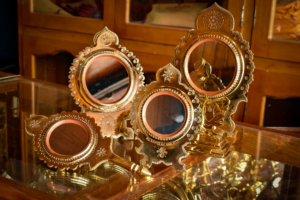Aranmula Kannadi: Sustaining Livelihoods in Kerala
 The ancient art of making handmade metal mirrors, known as Aranmula Kannadi, passed down through families, is more than just a tradition in the small state of Kerala, located in the southern part of India. This traditional livelihood expresses the power of Indigenous knowledge in sustaining livelihood and preserving cultural heritage.
The ancient art of making handmade metal mirrors, known as Aranmula Kannadi, passed down through families, is more than just a tradition in the small state of Kerala, located in the southern part of India. This traditional livelihood expresses the power of Indigenous knowledge in sustaining livelihood and preserving cultural heritage.
The Unique Craft of Aranmula Kannadi
Aranmula Kannadi is distinct from ordinary glass mirrors. Unlike conventional mirrors that reflect images off a glass surface backed by a silver coating, Aranmula Kannadi is made entirely of a special metal alloy that reflects directly from its polished surface. The secret behind its unique composition is closely guarded by a few artisan families in Aranmula, a village in Kerala, ensuring that the knowledge remains within their lineage.
Making these mirrors requires a precise combination of metals, an elaborate hand-polishing process and meticulous craftsmanship, making each piece a true work of art. Hence, the original Aranmula Kannadi can only be legally made in this location due to its geographical indications certification.
Sustaining Livelihood Through Indigenous Knowledge
For generations, the skilled artisans of Aranmula have dedicated themselves to perfecting this traditional craft. Making these mirrors is labor-intensive, requiring high precision and expertise. The mud is carefully prepared, the metal alloy is melted and cast and the surface is manually polished for several days to achieve the desired reflective quality.
Each piece is a labor of love, requiring patience, skill and a deep understanding of metallurgy. However, in an era dominated by mass production and digital advancements, the survival of such indigenous crafts faces significant challenges. The artisans of Aranmula Kannadi rely on traditional techniques that machines cannot replicate, making the production process slow and limited in scale. Despite these constraints, their commitment to preserving the craft remains unwavering.
The livelihood of these artisans depends heavily on the demand for their products. Efforts to promote Aranmula Kannadi as a luxury heritage product have helped sustain the community. Government initiatives, cultural exhibitions and collaborations with heritage organizations have played a crucial role in ensuring that the craft continues to thrive. Furthermore, the artisans have started adapting to modern marketing strategies, leveraging e-commerce platforms and social media to reach a global audience.
Economic and Social Impact on Local Communities
The livelihood of many families in Aranmula depends on this craft. The intricate process of mirror-making provides employment opportunities for local artisans, metalworkers and traders, forming an essential part of the region’s economic framework. However, the survival of this craft is often challenged by modern manufacturing techniques and mass-produced imitations.
Despite these hurdles, the dedication of traditional artisans ensures that authentic Aranmula Kannadi continues to thrive. The craft is also deeply tied to the social fabric of Aranmula, as it fosters a sense of identity and community pride. Many artisans see their work as more than just a means of income. It is an inherited responsibility to preserve the cultural heritage of their ancestors. The mirror holds religious and spiritual significance in Kerala’s temple rituals, wedding ceremonies and traditional festivals, reinforcing its value beyond a mere artifact.
Challenges and the Way Forward
Despite Aranmula Kannadi’s recognition, the artisans face multiple challenges, including the high cost of raw materials, competition from counterfeit products and a decline in the number of skilled artisans willing to take up the trade. Younger generations often hesitate to continue the legacy due to the economic uncertainties associated with traditional craftsmanship.
Awareness campaigns that highlight the uniqueness of Aranmula Kannadi can also help combat counterfeit products and ensure that customers recognize the value of authentic handmade mirrors. Sustainable tourism initiatives promoting heritage crafts can also create new opportunities for artisans. Craft villages, workshops and experiential tourism centered around the making of Aranmula Kannadi could attract enthusiasts and collectors worldwide, further boosting the local economy.
Conclusion
The story of Aranmula Kannadi is one of resilience and dedication, reflecting the strength of indigenous knowledge and its role in sustaining livelihoods. As globalization and modernization continue to shape industries, safeguarding traditional crafts that hold cultural and historical significance has become increasingly important. By supporting artisans, raising awareness and fostering innovation while respecting tradition, we can ensure that the legacy of Aranmula Kannadi continues to shine for generations to come.
– Syam Kumar
Syam is based in Roorkee, India and focuses on Good News for The Borgen Project.
Photo: Wikimedia Commons
